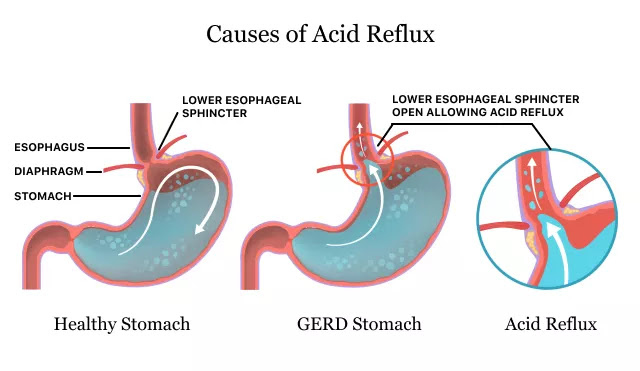What Causes Acid Reflux After Eating
| What Causes Acid Reflux After Eating |
Are you plagued by the ol' acid reflux? Fear not, dear reader, for we are here to shed some light on this troublesome affliction. Let's dive right in, shall we?
 |
| . |
The Culprit
When it comes to acid reflux, it all starts with your esophagus. This is the tube that connects your mouth to your stomach. Normally, there's a one-way valve at the bottom of your esophagus that keeps acid from coming back up. But for some, this valve doesn't work properly, allowing stomach acid to make its way back up and into your esophagus.
One cause of this faulty valve is a hiatal hernia, which occurs when the upper part of the stomach bulges up through the diaphragm and into the chest area. Other factors that can contribute to acid reflux include obesity, pregnancy, smoking, and certain medications.
The Symptoms

So, how can you tell if you're experiencing acid reflux? Well, for starters, you might feel a burning sensation in your chest or throat. This can be accompanied by a sour taste in your mouth or the feeling of a lump in your throat. Other symptoms can include difficulty swallowing, hoarseness, and coughing.
At this point, you might be thinking "wow, this sounds terrible". And you wouldn't be wrong! Acid reflux can be a real pain in the you-know-what. Fortunately, there are ways to both prevent and treat it.
The Prevention and Treatment
First and foremost, you can prevent acid reflux by avoiding certain foods and beverages that are known to trigger it. These can include things like spicy foods, citrus fruits, alcohol, and caffeine. It's also a good idea to eat smaller, more frequent meals and avoid eating right before bedtime.
If you're already experiencing acid reflux, there are a number of treatments available. Over-the-counter medications like antacids can help neutralize stomach acid and provide short-term relief. For more severe cases, prescription medications like proton pump inhibitors or H2 blockers might be necessary.
In some cases, surgery might be required to correct the issue. But for most, simple lifestyle changes and medication can keep acid reflux at bay.
The Takeaway
There you have it, folks! Acid reflux might be a pain in the neck (or chest, as it were), but it's not something you have to suffer through alone. By avoiding certain triggers and seeking proper treatment, you can get back to living your best life without the burning sensation of acid reflux holding you back.